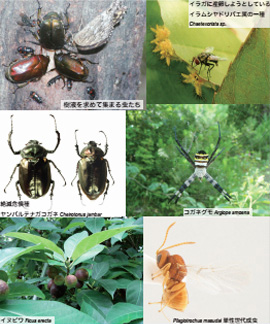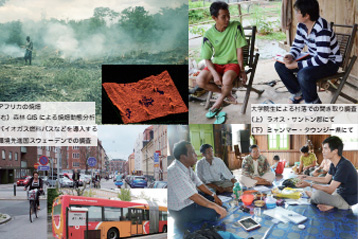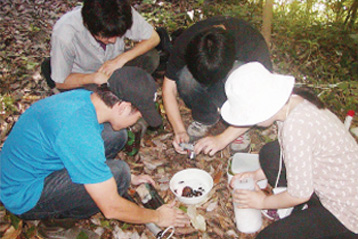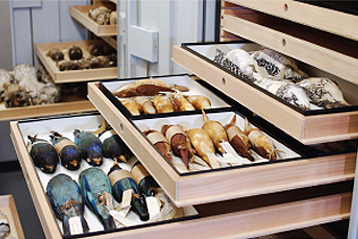- Student Life
-
- Academic & Class Calendars
- Syllabus/Timetable
- Scholarships, Student Support
- Information for International Students
- Doctoral Thesis Submission Process
- Application Forms, Notifications, Procedures
- Intensive Courses
- Learning Support for Students with Disabilities
- Methods of Integrated Interdisciplinary Research
- Counseling for International students
- Support Staff
- Interim Presentation
About ISGS
Courses of ISGS
Courses of ISGS
The study fields in the KEYWORD spectrum are organized into 6 courses
Comprehensive Science of Biological Environment Course
Comprehensive Science of Biological Environment Course
In the Comprehensive Science of Biological Environment Course, students research under the keywords, biodiversity and environment and the themes of conservation of biodiversity, as well as human adaptation to the environment and environmental protection policies. We inspire solutions to the urgent problems of the global environment and investigation into the new environmental science fields, through a comprehensive understanding of various fields related to biodiversity and the environment.
Encourage fieldwork ~ From the Ito campus to Tropical forests ~
Mainly in Asia, we engage in various research activities in each field, such as Biodiversity Science, Cultural Ecology, Tropical Forest Environmental Conservation and Environmental Policies.
-
Biodiversity Science and Biological Inventory Science
A wide range of organisms mainly arthropods, birds, reptiles, mammals, trees and soil microbes are the subjects of our research, and we set the goal toward elucidation of the whole aspect of biodiversity with various methods of science. Insects and spiders, birds, mammals, plants and soil microbes are main targets.
Insects and spiders, birds, mammals, plants and soil microbes are main targets.
 Students study present conditions of environmental problems and research the environmental adaptation of humans and the ideal methods of environmental policy through fieldwork, such as interviewing locals living in forests or their surrounding areas, and dynamic analysis using the geographical information system (GIS).
Students study present conditions of environmental problems and research the environmental adaptation of humans and the ideal methods of environmental policy through fieldwork, such as interviewing locals living in forests or their surrounding areas, and dynamic analysis using the geographical information system (GIS).
-
Tropical Forest Environmental Conservation
Ideal methods of natural resource management in forests around Southeast Asia and East Asia and their outskirts are researched based on the fieldwork in villages, policy study and bibliographic surveys. -
Environmental Policy Study
In this course, global warming is focused on among other environmental problems occurring in cities and policies taken by European countries taking advanced actions to solve the problems are studied.
What can you study at the Comprehensive Science of the Biological Environment Course?
Global environmental problems have come to be seen as problems of the entire human race, and the critical situation has made people’s interest in biodiversity increase, while environmental problems are frequently reported by the media. Since many environmental problems are caused by human activities, it is necessary not only to study natural science, but also understand the problems from the perspectives of multidirectional fields, including the relationship between the environment and humans. The students can deepen their knowledge of the fields where it is the main subject of each study in this course. But also this course provides an opportunity for them to study basic knowledge and theories over a wide range of fields such as biology, geography and political science.
-
Major Fields
Taxonomy, Phylogenetics, Inventory Science, Phylogeography, Population Genetics, Behavioral Ecology, Molecular Evolution, Conservation Biology, Synecology, Environmental Microbiology, Tropical Forest Environmental Conservation Study, Environmental Policy Study, Geography, etc. -
 The advanced analytical instruments housed at the Comprehensive Earth Science Course.
The Earth is in your hands! Show your original study.
The advanced analytical instruments housed at the Comprehensive Earth Science Course.
The Earth is in your hands! Show your original study.
Another thing that is emphasized in this course is the selection of subjects and on-the-spot decision making. Originality is important for study. For originality oriented study, we need to value our own ideas when planning research and actually visit fields and observe the research subjects by ourselves to collect data. Through fieldwork, we hope students can develop their abilities of observation, imagination and insight to discover hidden problems among complicated phenomenon and data collection and analysis skills to reveal problems. The advanced analytical instruments housed at the Comprehensive Earth Science Course.
The advanced analytical instruments housed at the Comprehensive Earth Science Course.
Careers after Graduation
In this course, many students have been visiting sites worldwide and have achieved important research results. Some became researchers at universities, companies or the research facilities of independent administrative agencies after completion of the course. We would like to nurture unique and independent researchers through developing their various interests extending from biodiversity to the environment, and from the environment to humans, while they study bio-philosophical questions such as “what is evolution?”, “what is species?” and “how can species be classified?”, as well as solution-type study, such as analyzing the possibility of the environmental policies to be realized and plotting the future image of the global environment.
Features of the Course
 Bird Specimen Collection of the National Museum of Nature and Science
In the Comprehensive Science of the Biological Environment Course, biological problems are focused on, while at the same time, paying attention to human existence in the biosphere. Students can wrestle with humanized biological problems, such as modern environmental problems, coexistence of humans with other organisms and environmental adaptation of humans. A generation of new and unique study fields are expected through a combination of fields, such as biology, geography, political science and forest science, etc. In addition, three teachers are invited from the independent administrative institute, the National Museum of Science and Nature to this course. They are some of the few experts in the "biological inventory science" fields in Japan.
Bird Specimen Collection of the National Museum of Nature and Science
In the Comprehensive Science of the Biological Environment Course, biological problems are focused on, while at the same time, paying attention to human existence in the biosphere. Students can wrestle with humanized biological problems, such as modern environmental problems, coexistence of humans with other organisms and environmental adaptation of humans. A generation of new and unique study fields are expected through a combination of fields, such as biology, geography, political science and forest science, etc. In addition, three teachers are invited from the independent administrative institute, the National Museum of Science and Nature to this course. They are some of the few experts in the "biological inventory science" fields in Japan.
Students can study using specimens and materials in the museum laboratory, according to their requests. We welcome students who wish to study positively and enthusiastically, such as those who would like to study systematics, biogeography, behavior and ecology in great natural surroundings, along with those who have a desire to engage in environmental conservation, and study the relationship between humans and the environment, and environmental policy. Why don’t you live the research life with us?
 Bird Specimen Collection of the National Museum of Nature and Science
Bird Specimen Collection of the National Museum of Nature and Science
Faculty List
International Program
| Name | Post | Field of Specialization | Keyword |
|---|---|---|---|
| KUSUMI Junko | Professor | Molecular evolution, Population Genetics | Biodiversity, Population genetics, Molecular phylogeny, Co-evolution |
| ABE Yoshihisa | Professor | Biodiversity science | |
| ARAYA Kunio | Professor | Entomology | |
| HYAKUMURA Kimihiko | Professor | Natural Resource Management, Environment Sociology,Forest Policy, | local participation,local people, decentralization |
| YAMASHITA Jun | Professor | Environmental geography, Regional planning, Geographical information science | |
| MISHIMA Misako | Professor | plant phylogeny | |
| MATSUMOTO Masaru | Professor | Tropical Plant Pathology, Environment Microbiology | |
| TACHI Takuji | Associate Professor | Entomology, Systematics, Morphology, Molecular phylogeny | Diptera, Parasitoid, Tachinidae, Host preference, Stable isotope (C and N) |
| FUJIOKA Yuichiro | Associate Professor | Geography, Landscape Ecology, Africa Area Study | Vegetation, Natural Resource Use, Biodiversity Conservation, Landscape Classification, Livelihood changes, Agroforest, Rural development, Africa |
| MATSUO Kazunori | Lecturer | Entomology | |
| OGAWA Kota | Assistant Professor | ||
| NOMURA Shuhei | 客員教授 | ||
| NISHIUMI Isao | 客員教授 | ||
| IDE Tatsuya | 客員准教授 |